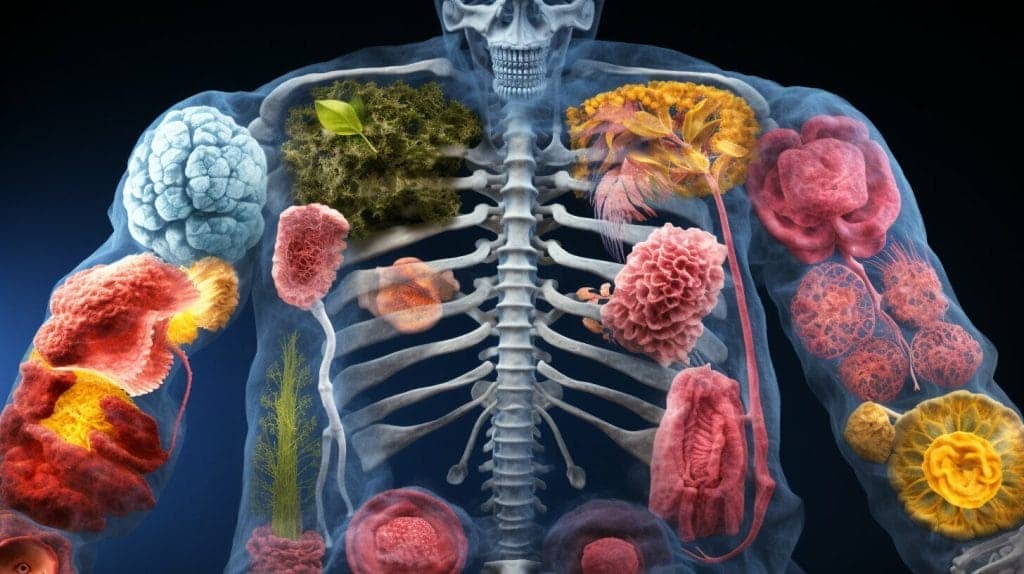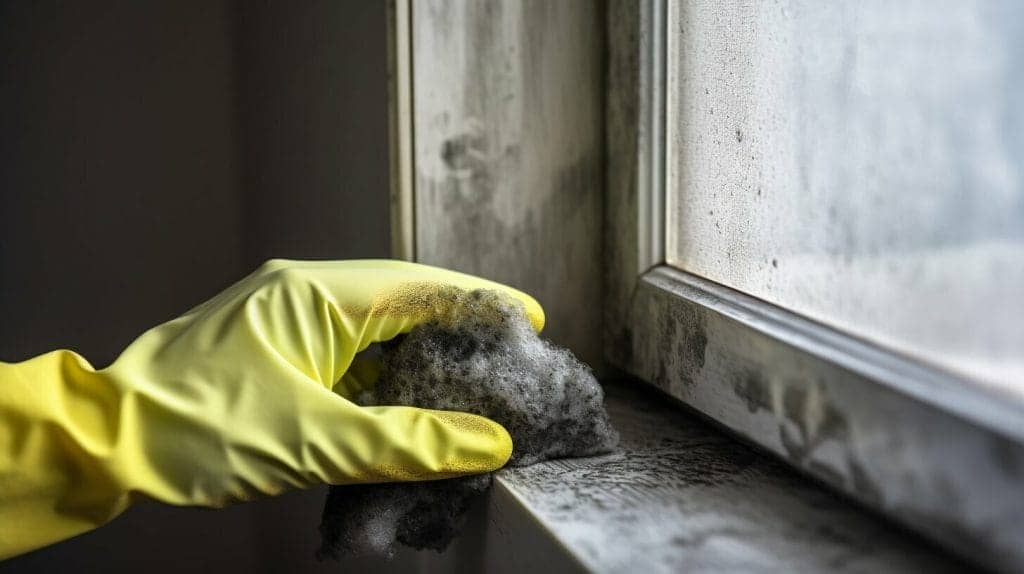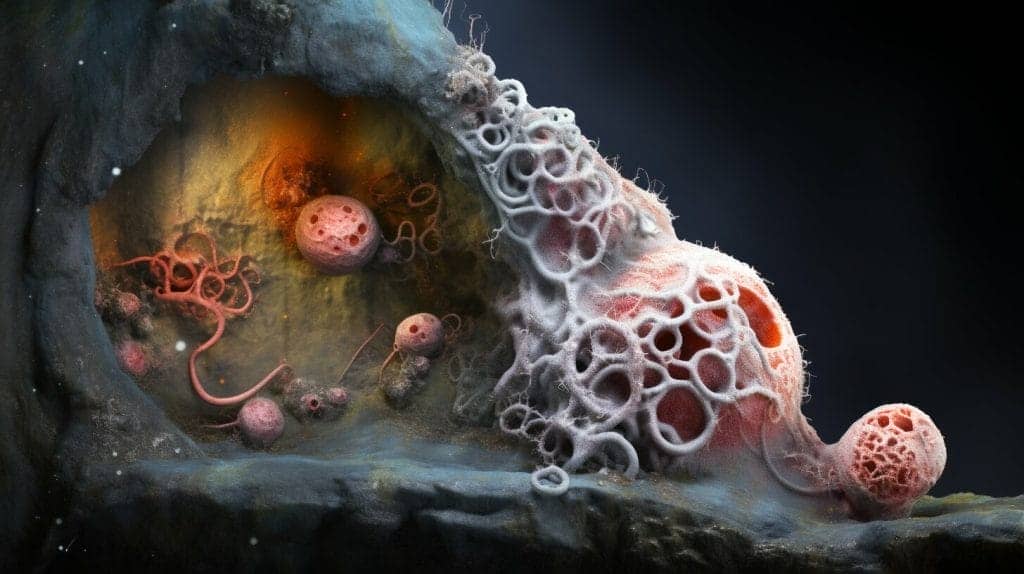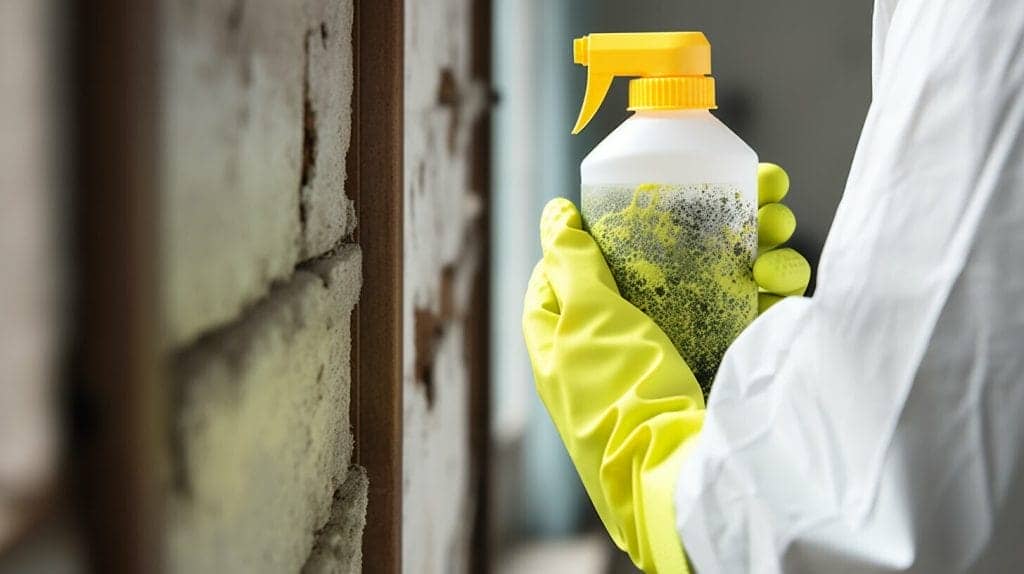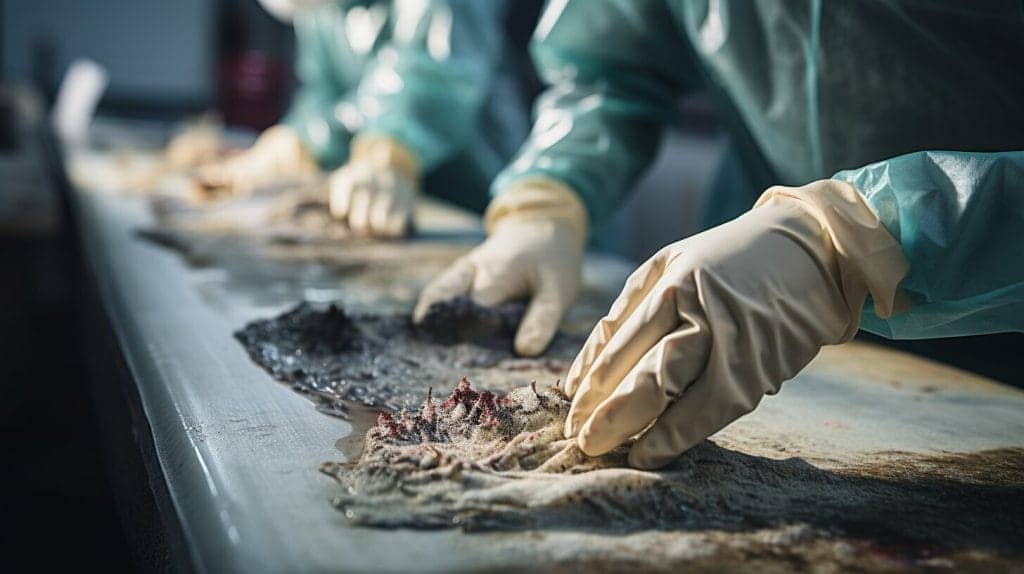Mycotoxins are toxic substances produced by certain molds. Exposure to these toxins can lead to a range of health problems, including organ system impacts. Understanding the effects of mycotoxin exposure on the human body is crucial for prevention and treatment.
Key Takeaways:
- Mycotoxins are toxic substances produced by some molds.
- Exposure to mycotoxins can have harmful impacts on various organ systems in the body.
- Prevention and diagnosis strategies can help reduce risk of mycotoxin exposure and related illnesses.
- Holistic treatment options, such as those offered at Oasis Medical Institute, can support overall well-being in individuals affected by mycotoxin organ system impacts.
Understanding Mycotoxin Exposure
Mycotoxins are toxic substances that are produced by certain types of fungi. These fungi can be found in a variety of environments, including homes, schools, and workplaces. Mycotoxins can be released into the air, water, and food supply, and can cause a range of health effects in humans, including mycotoxin-related diseases.
The health effects of mycotoxin exposure can vary depending on a number of factors, including the type of mycotoxin, the dose received, and the individual’s sensitivity to the toxin. Some people may be more susceptible to mycotoxin-related illnesses than others, particularly those with weakened immune systems or pre-existing health conditions.
Exposure to mycotoxins can occur through a variety of means, including inhalation, ingestion, and skin contact. Sources of mycotoxin contamination can include moldy food, water-damaged buildings, and contaminated soil. Individuals who work in environments where mycotoxins are present, such as agricultural workers and construction workers, may be at higher risk of exposure.
The potential health effects of mycotoxin exposure are numerous and can include respiratory problems, neurological symptoms, cardiovascular disease, and kidney damage. Some mycotoxin-related diseases include aspergillosis, aflatoxicosis, and ochratoxicosis.
It is important for individuals to be aware of the potential for mycotoxin exposure and to take steps to minimize their risk. This can include avoiding moldy or water-damaged buildings, using appropriate protective gear when working in environments where mycotoxins are present, and properly storing and preparing food to avoid contamination.
Diagnostic testing is available for individuals who are concerned about potential mycotoxin-related illnesses. These tests can help identify the presence of mycotoxins in the body and can guide treatment decisions.
Overall, understanding mycotoxin exposure and the potential health effects is crucial for maintaining good health and well-being.
Mycotoxin-Induced Organ Damage
Mycotoxins are toxic compounds produced by certain molds that can have adverse effects on the human body. When exposed to mycotoxins, different organ systems can be impacted and can lead to organ damage and dysfunction. Understanding the specific effects of mycotoxins on each organ system is crucial in identifying and treating mycotoxin-related illnesses.
Mycotoxin-induced organ damage can be caused by a variety of mechanisms, including direct toxic effects, immune system activation, and oxidative stress. Different mycotoxins can have varying impacts on organ systems, and exposure can result in a wide range of symptoms and illnesses.
| Organ System | Effects of Mycotoxin Exposure |
|---|---|
| Respiratory | Coughing, wheezing, asthma, bronchitis |
| Neurological | Headaches, dizziness, cognitive impairment, tremors |
| Cardiovascular | High blood pressure, heart disease, blood clotting disorders |
| Digestive | Abdominal pain, nausea, vomiting, diarrhea |
| Immune | Increased susceptibility to infections, autoimmune disorders |
| Renal | Kidney damage, renal failure |
Mycotoxin-induced organ damage can be difficult to diagnose, as symptoms can vary widely and may not be immediately apparent. However, if left untreated, mycotoxin-related illnesses can lead to serious long-term health consequences.
It is important to take preventative measures to reduce mycotoxin exposure and seek medical attention if symptoms arise. In cases of suspected mycotoxin exposure, diagnostic tests can be used to identify the specific mycotoxin and the extent of organ damage.
With proper diagnosis and treatment, it is possible to manage mycotoxin-induced organ damage and alleviate symptoms. Integrative approaches to treatment, such as those offered at Oasis Medical Institute, can be effective in addressing the root causes of mycotoxin-related illnesses and supporting overall well-being.
Respiratory System Effects
Mycotoxins can have various detrimental effects on the respiratory system. Exposure to mycotoxins can lead to respiratory symptoms, such as coughing, wheezing, and shortness of breath. In severe cases, mycotoxin exposure can cause asthma and other respiratory illnesses.
Mold spores, which are commonly found in mycotoxin-contaminated environments, can also cause respiratory problems. When inhaled, mold spores can trigger allergic reactions, such as sneezing, runny nose, and itchy eyes. In some cases, exposure to mold can also lead to the development of fungal infections in the lungs.
The severity of respiratory symptoms caused by mycotoxins can vary depending on the individual’s sensitivity to the toxin, the length of exposure, and the concentration of mycotoxins in the environment. However, it is important to note that prolonged exposure to mycotoxins can have lasting effects on respiratory health.
Preventative Measures
To prevent respiratory problems caused by mycotoxin exposure, it is crucial to identify and eliminate sources of mycotoxin contamination in indoor environments. This may involve a thorough inspection of the premises, including the detection and removal of any mold growth. Proper ventilation and air purification systems can also help reduce the concentration of mycotoxins in the air.
Individuals with respiratory conditions, such as asthma, should take extra precautions to avoid exposure to mycotoxins. This may include wearing a mask when cleaning moldy areas or avoiding outdoor activities during high humidity or damp weather conditions.
Treatment Options
Treatment for respiratory symptoms caused by mycotoxin exposure may involve the use of medications to manage symptoms, such as bronchodilators or corticosteroids. In addition, individuals may benefit from immunotherapy, which can help reduce sensitivity to specific allergens.
However, it is important to note that treating respiratory symptoms caused by mycotoxin exposure may not fully address underlying issues related to mycotoxin toxicity in other organ systems. Therefore, an integrative approach, such as that offered by Oasis Medical Institute in Tijuana, may be necessary to fully address mycotoxin organ system impacts.
Neurological System Effects
Mycotoxins can have a significant impact on the neurological system, leading to a range of symptoms and conditions. Exposure to mycotoxins has been linked to headaches, dizziness, and cognitive impairment.
Research suggests that mycotoxin-related illnesses, such as chronic inflammatory response syndrome (CIRS) and multiple chemical sensitivity (MCS), can also have neurological effects. These conditions can cause a range of symptoms, including brain fog, memory problems, and difficulty concentrating.
One of the ways mycotoxins can affect the neurological system is by disrupting the blood-brain barrier (BBB). The BBB is responsible for regulating what substances can enter the brain. When it is compromised, harmful substances, including mycotoxins, can enter the brain and cause damage.
Overall, the neurological effects of mycotoxin exposure can be significant and long-lasting. It is crucial for individuals who have been exposed to mycotoxins to seek medical attention if they experience any neurological symptoms or conditions.
Cardiovascular System Effects
Mycotoxin exposure can have significant impacts on the cardiovascular system, leading to various diseases and conditions. Mycotoxins can affect the heart, blood vessels, and blood cells, leading to decreased heart function, irregular heartbeats, and increased risk of heart attack and stroke.
One of the primary cardiovascular effects of mycotoxin exposure is the impairment of blood flow and oxygen delivery to the heart muscle. This can lead to decreased heart function, chest pain, and heart failure. Mycotoxins can also cause inflammation in the blood vessels, leading to atherosclerosis, or the buildup of plaque in the arteries. This can increase the risk of heart attack and stroke.
In addition to the effects on the heart and blood vessels, mycotoxins can also impact blood cells. Exposure to mycotoxins can cause changes in the number and function of white blood cells, leading to immune system dysfunction and increased susceptibility to infections. Mycotoxins can also cause changes in the production and function of red blood cells, leading to anemia and decreased oxygen delivery to the body’s tissues.
Prevention and Management
Prevention of mycotoxin-related cardiovascular disease involves reducing exposure to mycotoxins through proper food storage and preparation and maintaining clean indoor air quality. Management strategies for individuals affected by mycotoxin-related cardiovascular disease may include medications to manage heart function and blood pressure, as well as lifestyle modifications such as diet and exercise.
Oasis Medical Institute in Tijuana, MX offers a holistic approach to treating mycotoxin-related illnesses, including cardiovascular disease. Dr. Francisco Contreras MD and his team provide individualized treatment plans that often include lifestyle modifications, nutritional support, and alternative therapies to support the body’s natural healing processes.
Digestive System Effects
Mycotoxin exposure can also have significant impacts on the digestive system. While mycotoxins primarily affect organs such as the liver and kidneys, they can also cause damage to the gastrointestinal tract.
When ingested, mycotoxins can cause a range of gastrointestinal symptoms, including nausea, vomiting, abdominal pain, and diarrhea. In some cases, mycotoxins can also cause more severe conditions, such as hemorrhagic colitis or gastroenteritis.
| Mycotoxin-Induced Organ Damage | Examples of Gastrointestinal Symptoms |
|---|---|
| Damage to liver and kidney | Nausea |
| Stomach ulcers | Vomiting |
| Colon cancer | Abdominal pain |
| Inflammation of gastrointestinal tract | Diarrhea |
The effects of mycotoxin exposure on the digestive system can be long-lasting and difficult to treat, particularly if the exposure was chronic or at high doses. In some cases, mycotoxins can even contribute to the development of colon cancer.
If you are experiencing gastrointenstinal symptoms that you suspect may be related to mycotoxin exposure, it is important to seek medical attention. A healthcare provider can perform tests to diagnose any underlying conditions and provide appropriate treatment.
Immune System Effects
Research has revealed that mycotoxin exposure can significantly affect the immune system, which is responsible for fighting off infections and diseases.
Mycotoxins can suppress immune function by reducing the production of cytokines and impairing the function of white blood cells. This can weaken the body’s defenses and increase susceptibility to infections.
Furthermore, mycotoxin exposure has been linked to the development of autoimmune diseases, such as lupus and rheumatoid arthritis, as well as certain cancers.
To mitigate the effects of mycotoxin-related illnesses on the immune system, it is important to support overall health through proper nutrition, stress management, and exercise. Holistic treatments, such as those offered at Oasis Medical Institute, can also help to boost immune function and promote healing.
Renal System Effects
The renal system is responsible for regulating body fluid balance, removing waste products from the body, and controlling electrolytes. Mycotoxin exposure can have damaging effects on this critical system, leading to renal dysfunction.
Studies have shown that certain mycotoxins, such as ochratoxin A and aflatoxin, can contribute to the development of kidney damage and chronic renal disease. Ochratoxin A has been linked to interstitial nephritis, which is a condition involving inflammation of the kidney tubules. Aflatoxin exposure has been associated with increased risk of renal cell carcinoma.
Mycotoxin-induced organ damage to the renal system can manifest in various ways, including proteinuria, hematuria, and decreased glomerular filtration rate. Symptoms may include fatigue, weakness, and swelling in the legs and feet.
If left untreated, mycotoxin-induced damage to the renal system can lead to serious complications, such as kidney failure. Therefore, it is crucial to take appropriate measures to prevent mycotoxin exposure and seek medical attention if symptoms arise.
Mycotoxin-Induced Renal Damage Prevention and Treatment
To prevent mycotoxin-induced renal damage, individuals should take precautions to avoid exposure to contaminated food and water sources. This includes properly storing and cooking food, regularly checking for water leaks, and avoiding mold-prone areas such as basements and attics.
Treatment for mycotoxin-induced renal damage typically involves managing symptoms and addressing the underlying causes of the damage. In some cases, medications or other interventions may be recommended to improve kidney function.
Integrative Treatment Approaches
When it comes to addressing mycotoxin organ system impacts, an integrative approach to treatment can be highly effective. At the Oasis Medical Institute in Tijuana, MX, a holistic approach is taken to treat mycotoxin-related illnesses. Combining traditional medical practices with complementary therapies, the team at Oasis Medical Institute offers a unique and comprehensive program designed to help patients achieve optimal health.
The holistic treatments at Oasis Medical Institute aim not only to alleviate symptoms but also to address the root cause of mycotoxin toxicity. By taking a whole-person approach, the team can tailor treatment plans to meet the unique needs of each patient. This approach can help promote healing and restore balance to the body.
The integrative approach to treatment at Oasis Medical Institute may include a combination of conventional medical treatments and complementary therapies such as nutrition counseling, acupuncture, and mind-body techniques. These complementary therapies aim to support the body’s natural healing processes and enhance overall well-being.
At Oasis Medical Institute, patients can expect to receive compassionate care and expert guidance from a team of experienced healthcare professionals. If you’re looking for a holistic approach to addressing mycotoxin organ system impacts, Oasis Medical Institute may be the right choice for you.
Dr. Francisco Contreras MD and Mold Toxicity Treatment
Dr. Francisco Contreras MD is a renowned expert in the field of holistic medicine, with a special focus on the treatment of mycotoxin-related illnesses. He is the Medical Director and CEO of Oasis of Hope Hospital in Tijuana, Mexico, a leading institution offering integrative treatments for cancer and other chronic diseases.
Dr. Contreras has developed a holistic Mold Toxicity treatment program at Oasis Medical Institute, which takes a comprehensive approach to address the root causes of mycotoxin-induced organ damage. The program combines conventional and alternative therapies to create a personalized treatment plan for each patient.
Dr. Contreras believes in treating the whole person, not just the disease. His approach integrates nutrition, exercise, stress management, and other lifestyle modifications to enhance overall health and well-being. He has helped countless patients overcome Mold Toxicity and regain their quality of life.
Integrative Treatment Approaches
Dr. Contreras’s integrative approach to Mold Toxicity treatment involves combining conventional medical treatments with complementary therapies such as acupuncture, massage therapy, and nutritional counseling. This approach aims to not only treat the symptoms but also address the underlying causes of mycotoxin-related illnesses.
Dr. Contreras believes in empowering patients to take an active role in their own healing process. He educates patients about the potential health risks associated with mycotoxin exposure and provides them with the tools they need to make healthy lifestyle choices.
“At Oasis Medical Institute, we take a whole-person approach to treating Mold Toxicity. Our goal is to help patients achieve optimal health and well-being, not just manage their symptoms.”
Holistic Mold Toxicity Treatment Program
The holistic Mold Toxicity treatment program at Oasis Medical Institute includes a comprehensive range of diagnostic tests and treatments. Diagnostic tests may include blood tests, urine tests, and imaging studies to evaluate organ function and detect mycotoxin contamination.
The treatment plan may include a combination of conventional medical treatments, such as medication and surgery, as well as alternative therapies such as ozone therapy, hyperbaric oxygen therapy, and nutritional supplementation. These treatments work together to support the body’s natural healing processes and promote overall health and well-being.
Book a Consultation at Oasis Medical Institute
If you or a loved one is suffering from mycotoxin organ system impacts, don’t wait to seek help. Book a consultation at Oasis Medical Institute to explore the holistic Mold Toxicity treatment program with Dr. Francisco Contreras MD. To schedule an appointment, call 866-868-1992 or visit our website for more information.
Prevention and Diagnosis Strategies
Mycotoxins can have serious health impacts on organ systems in the body, so prevention and diagnosis strategies are crucial. Limiting exposure to mycotoxin contamination is the first line of defense against mycotoxin-induced organ damage. Individuals can take practical steps to reduce mycotoxin exposure, such as:
- Regularly cleaning and airing out living spaces
- Controlling humidity levels to prevent mold growth
- Properly storing food to prevent mold growth and mycotoxin contamination
- Using proper protective gear when handling potentially contaminated materials
If an individual suspects they have been exposed to mycotoxins and are experiencing symptoms, they should seek medical attention. A medical professional can perform diagnostic tests to identify mycotoxin-related illnesses. These tests may include:
- Blood tests
- Urine tests
- Imaging tests, such as X-rays or CT scans
- Tests to identify the specific mycotoxin present in the body
Early diagnosis and treatment of mycotoxin organ system impacts can prevent further organ damage and improve overall health outcomes.
Management and Supportive Care
For individuals who have been affected by mycotoxin organ system impacts, management and supportive care are crucial for alleviating symptoms and supporting overall well-being. The first step is to reduce exposure to mycotoxin contamination by identifying and addressing sources of contamination in the home or workplace.
Medical treatment options may include medication to relieve symptoms and support organ function. Integrative and holistic approaches, such as those offered at Oasis Medical Institute in Tijuana, MX, may also be beneficial in addressing mycotoxin-induced organ damage.
Lifestyle modifications can also play a role in management and supportive care. A healthy diet low in mycotoxin-contaminated foods and high in antioxidants can help reduce inflammation and support immune function. Regular exercise, stress management techniques, and adequate sleep can also support overall health and well-being.
It is also essential to work with a healthcare provider to develop an individualized plan for managing mycotoxin organ system impacts and addressing any associated conditions or symptoms. Regular check-ins and monitoring can ensure that treatment is effective and appropriate for the individual’s needs.
Book a Consultation at Oasis Medical Institute
If you or someone you know has been affected by mycotoxin organ system impacts, it is important to seek holistic treatment that addresses the root cause of the illness. At Oasis Medical Institute in Tijuana, MX, Dr. Francisco Contreras MD offers a comprehensive Mold Toxicity treatment program that combines traditional and alternative therapies to help patients achieve optimal health.
To book a consultation with Dr. Contreras and learn more about the holistic Mold Toxicity treatment program, call 866-868-1992 today. Take the first step towards improving your health and well-being.
Call-to-Action
Don’t wait to address the potential impacts of mycotoxin exposure on your organ systems. Experience the holistic Mold Toxicity treatment program at Oasis Medical Institute with Dr. Francisco Contreras MD. Contact us today to book a consultation and take the first step towards optimal health and well-being.
Conclusion
Exposure to mycotoxins can have detrimental impacts on various organ systems in the body, leading to a range of health issues. It is crucial to understand the potential effects of mycotoxin exposure and take preventive measures to reduce the risk of contamination. In cases where mycotoxin-related illnesses have already manifested, it is important to seek proper diagnosis and treatment.
At Oasis Medical Institute in Tijuana, MX, Dr. Francisco Contreras MD offers an integrative approach to treating mycotoxin organ system impacts. His holistic Mold Toxicity treatment program incorporates a range of therapies aimed at addressing the root cause of the illness and supporting overall well-being.
If you are experiencing mycotoxin-related symptoms or would like to learn more about preventing exposure, book a consultation with Oasis Medical Institute by calling 866-868-1992. Don’t wait to take action towards improving your health and well-being.
FAQ
Q: What are mycotoxins?
A: Mycotoxins are toxic compounds produced by certain types of fungi. They can contaminate food, feed, and indoor environments, posing potential health risks to humans and animals.
Q: How are individuals exposed to mycotoxins?
A: Individuals can be exposed to mycotoxins through ingestion, inhalation, or dermal contact. Ingestion occurs when consuming contaminated food or beverages, inhalation happens when breathing in fungal spores or mycotoxin-contaminated dust, and dermal contact occurs when the skin comes into direct contact with mycotoxin-containing materials.
Q: What are the potential health risks associated with mycotoxin exposure?
A: Mycotoxin exposure has been linked to various health effects, including respiratory problems, neurological symptoms, cardiovascular issues, gastrointestinal disturbances, immune system suppression, and kidney damage. The severity of these health risks can vary depending on the type and concentration of mycotoxins involved, as well as individual susceptibility factors.
Q: How do mycotoxins affect the respiratory system?
A: Mycotoxin exposure can lead to respiratory symptoms such as coughing, wheezing, chest tightness, and difficulty breathing. Prolonged exposure to mycotoxins may contribute to the development or exacerbation of respiratory conditions such as asthma or bronchitis.
Q: What are the neurological effects of mycotoxin exposure?
A: Mycotoxin exposure has been associated with neurological symptoms such as headaches, dizziness, fatigue, memory problems, difficulty concentrating, and mood changes. Some studies have also suggested a potential link between mycotoxin exposure and neurodegenerative diseases.
Q: How does mycotoxin exposure affect the cardiovascular system?
A: Mycotoxin exposure can impact the cardiovascular system by causing symptoms like high blood pressure, irregular heartbeats, chest pain, and decreased exercise tolerance. Long-term exposure to certain mycotoxins has also been associated with an increased risk of cardiovascular diseases.
Q: What are the digestive system effects of mycotoxin exposure?
A: Mycotoxin exposure can lead to gastrointestinal symptoms such as nausea, vomiting, abdominal pain, diarrhea, and loss of appetite. In some cases, mycotoxin contamination in food can cause food poisoning or contribute to the development of digestive disorders.
Q: How does mycotoxin exposure affect the immune system?
A: Mycotoxins can suppress the immune system, making individuals more susceptible to infections. They can also dysregulate immune responses, leading to allergic reactions or autoimmune conditions. Prolonged immune system suppression due to mycotoxin exposure may increase the risk of secondary infections.
Q: What is the impact of mycotoxin exposure on the renal system?
A: Mycotoxin exposure can contribute to kidney damage and renal dysfunction. Some mycotoxins have been linked to the development of kidney diseases, including kidney failure. Individuals with pre-existing kidney conditions may be particularly vulnerable to the renal effects of mycotoxins.
Q: How can Oasis Medical Institute help with mycotoxin organ system impacts?
A: Oasis Medical Institute, led by Dr. Francisco Contreras MD, offers holistic treatment approaches for mycotoxin-related illnesses. Their integrative approach focuses on addressing the underlying causes of mycotoxin organ system impacts and supporting overall well-being.
Q: Who is Dr. Francisco Contreras MD and what is his expertise in treating Mold Toxicity?
A: Dr. Francisco Contreras MD is an experienced physician specializing in integrative medicine. He has extensive knowledge and expertise in treating Mold Toxicity and has developed a holistic treatment program to address the organ system impacts of mycotoxin exposure.
Q: How can mycotoxin organ system impacts be prevented and diagnosed?
A: Preventing mycotoxin organ system impacts involves minimizing exposure to mycotoxins by implementing proper food handling and storage practices, improving indoor air quality, and addressing moisture or water damage issues. Diagnostic tests, such as mycotoxin testing and comprehensive health assessments, can help identify mycotoxin-related illnesses.
Q: What management and supportive care options are available for mycotoxin organ system impacts?
A: Various management strategies and supportive care options are available for individuals affected by mycotoxin organ system impacts. These may include dietary adjustments, detoxification protocols, immune system support, symptom management, stress reduction techniques, and lifestyle modifications to promote overall health and well-being.
Q: How can I book a consultation at Oasis Medical Institute for holistic Mold Toxicity treatment?
A: To book a consultation at Oasis Medical Institute and explore their holistic Mold Toxicity treatment program, please call 866-868-1992. Their team will assist you in scheduling an appointment and providing further information.
Q: What should I do to address mycotoxin organ system impacts?
A: If you suspect you are experiencing mycotoxin organ system impacts, it is important to take action. Seeking medical advice, implementing preventive measures, and considering holistic treatment options can help address the effects of mycotoxin exposure and support long-term health.
Dr. Francisco Contreras, MD is a renowned integrative medical physician with over 20 years of dedicated experience in the field of integrative medicine. As the Medical Director of the Oasis of Hope Hospital in Tijuana, Mexico, he has pioneered innovative treatments and integrative approaches that have been recognized globally for the treatment of cancer, Lyme Disease, Mold Toxicity, and chronic disease using alternative treatment modalities. Dr. Contreras holds a medical degree from the Autonomous University of Mexico in Toluca, and speciality in surgical oncology from the University of Vienna in Austria.
Under his visionary leadership, the Oasis of Hope Hospital has emerged as a leading institution, renowned for its innovative treatments and patient-centric approach for treating cancer, Lyme Disease, Mold Toxicity, Long-Haul COVID, and chronic disease. The hospital, under Dr. Contreras's guidance, has successfully treated thousands of patients, many of whom traveled from different parts of the world, seeking the unique and compassionate care the institution offers.
Dr. Contreras has contributed to numerous research papers, articles, and medical journals, solidifying his expertise in the realm of integrative medicine. His commitment to patient care and evidence-based treatments has earned him a reputation for trustworthiness and excellence. Dr. Contreras is frequently invited to speak at international conferences and has been featured on CNN, WMAR2 News, KGUN9 News, Tyent USA, and various others for his groundbreaking work. His dedication to the medical community and his patients is unwavering, making him a leading authority in the field.
Contreras has authored and co-authored several books concerning integrative therapy, cancer, Lyme Disease and heart disease prevention and chronic illness, including "The Art Science of Undermining Cancer", "The Art & Science of Undermining Cancer: Strategies to Slow, Control, Reverse", "Look Younger, Live Longer: 10 Steps to Reverse Aging and Live a Vibrant Life", "The Coming Cancer Cure Your Guide to effective alternative, conventional and integrative therapies", "Hope Medicine & Healing", "Health in the 21st Century: Will Doctors Survive?", "Healthy Heart: An alternative guide to a healthy heart", “The Hope of Living Cancer Free”, “Hope Of Living Long And Well: 10 Steps to look younger, feel better, live longer” “Fighting Cancer 20 Different Ways”, "50 Critical Cancer Answers: Your Personal Battle Plan for Beating Cancer", "To Beat . . . Or Not to Beat?", and “Dismantling Cancer.”

